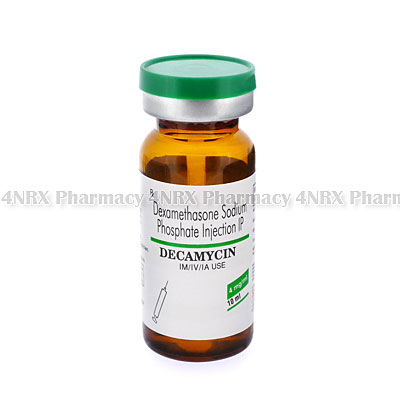 |
Home  General Health General Health  Decamycin (Dexamethasone) Decamycin (Dexamethasone) |
|
|||||||||
|
Decamycin (Dexamethasone)
What is Decamycin (Dexamethasone) used for? Decamycin (Dexamethasone) is a type of corticosteroid which is similar to a natural hormone produced by the body. This medication is used to relieve inflammation and allergic type reactions. It is used to treat various conditions, such as arthritis, severe allergic reactions, blood or eye diseases, asthma, certain types of cancer, intestinal disorders and skin diseases. It may also be used as a diagnostic aid, to test for Cushing's syndrome. Apart from the above mentioned uses, this drug is sometimes given to chemotherapy patients to prevent nausea and vomiting. How should I use Decamycin (Dexamethasone)? Decamycin (Dexamethasone) comes in the form of an injection. It is normally administered by a physician or healthcare professional. Your physician will advise you on the correct dosage. If your physician has instructed you to administer this medication at home, you must learn the correct preparation procedure, as well as how to properly administer it. Before use, you must check this product for signs of particles or discoloration, and if you notice any, you should not use it. What are the side effects of Decamycin (Dexamethasone)? Decamycin (Dexamethasone) may cause some side effects, such as:
You should immediately consult your physician if any of these side effects persist, or if other more serious side effects occur, including changes in vision, breathlessness, changes in behavior, bloody stools, coughing up blood, seizures or pancreatitis. Please Note Strictly follow all instructions provided to you by your physician or pharmacist while using Decamycin (Dexamethasone). Optimum and safe dosage can differ based on the patient and the condition being treated. As this medication may be unsafe for certain patients, it is essential you always inform your physician if you are pregnant or breastfeeding, as well as if you have any allergies, other illnesses, or ongoing health conditions, and if you are taking any other form of medication, supplements, or herbal products. You should carry an ID card or wear a bracelet stating that you are currently taking corticosteroid medication. Immediately seek emergency medical care if you have any allergic or hypersensitive reaction. Common signs of a reaction include hives, swelling, skin rashes, chest pains, as well as trouble breathing or swallowing. 
|
|||||||||||||||||